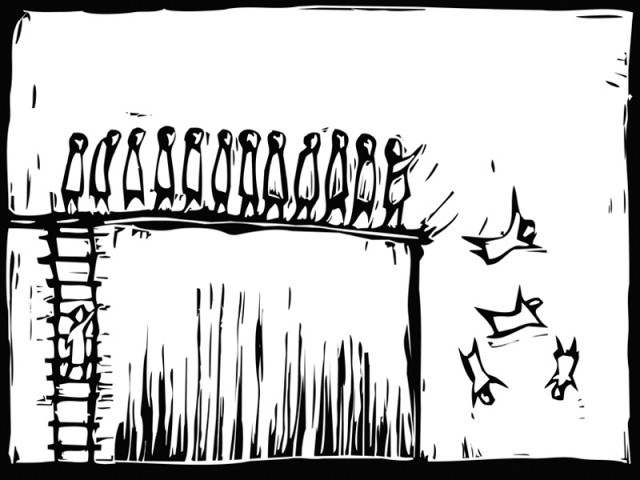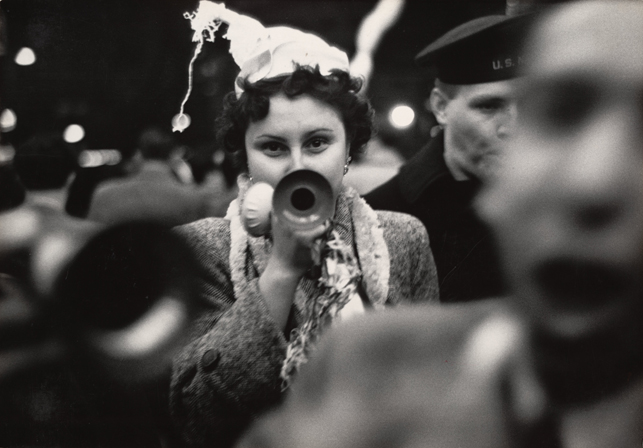How to pronounce the name of that ancient grain quinoa, be it keen-wah or kin-oh-wah, is the catalyst for a story about one man’s dramatic descent into madness…

by: David Simmons
When he is at the bottom of the pit, in the deepest throes of despair, Palaver DeGroot fantasizes about commiting suicide in the gazebo of his Auntie’s Walnut Creek mansion. The way he envisions it — the way it plays out in his head — is that he sits under the gazebo, ensconced in white linen, a sweet tea beside him and his chest smeared with grease. The way he sees it, he puts the barrel of the .357 Desert Eagle in his mouth; he tastes the cold steel; he feels uncomfortable due to the phallic nature of the barrel and the position of the aforementioned barrel in his mouth, so he removes it from his mouth. He rearranges the barrel so that it is pushing upwards against his chin, aiming towards the sky through the top of his skull — then he opens the sunroof to let the light shine in. Tendrils of gore shoot from his ears. Viscera confetti covers the stained wood of the gazebo.
To understand Palaver DeGroot, one must first understand why he hates his Auntie so much. Some of it has to do with the condescending nature of quinoa — which Palaver will insist that you know — is pronounced nothing like it is spelled. On the day he was released from the in-patient treatment program at the John George Psychiatric Hospital in Castro Valley, quinoa would rear its ugly head and show up with all intents and purposes of mocking and belittling him.
The way it happened: Palaver drops his meager possessions at his feet when he reaches the front door of the mansion. He knocks. Twice. Then three times more.
“Hold your horses, I’m coming. I’m coming,” says a woman’s voice from the other side of the door. The voice has a Long Island, New York accent, or at least what Palaver believes a Long Island, New York accent would sound like. The door swings open in a cloud of patchouli and hairspray.
“Oh my goodness! My how you’ve grown! I remember when ya’ motha brought ya’ by ya’ Grandma’s. I can’t believe it’s been…what? Ten, fifteen years?”
Palaver sighs. “Twenty-six years Auntie.”
Auntie waves Palavar’s concerns aside with her pale blue, skeleton hands. “Ten years, twenty-six years, whatsamatta? Am I right?”
Palaver takes inventory of his surroundings. The foyer is large, spacious. The floors are hardwood. The furniture is 18th century Rococo, interspersed amongst rosewood Chippendale pieces. Palaver’s Auntie is affluent. She wanders off, into the burgundy shadows of the mansion.
“Of course. You must be famished. Let me make you something,” Auntie’s voice drifts out from deeper within the shadows of the house.
Palaver absentmindedly traces the curves and contours of the crown molding. “I don’t have much of an appetite.”
“Nonsense,” she insists. “Do you like keen-wah?”
Palaver has never heard this word before. Keen-wah. He wonders what the word could mean. Obviously keen-wah is a food item, based on context clues. Palaver is nobody’s fool.
He begins to answer, “I —” but is cut off by the larger and more dominant personality that is his Auntie.
“What am I thinking?” she says, interrupting him. “Chrissakes. How would you know if you like keen-wah or not? Probably don’t even know what it is. Of course they don’t have it yet on the east coast. What am I thinking, right? I wouldn’t expect the bumpkins back home to know about a food as progressive as keen-wah. Goodness. Ya’ have to excuse me. These new meds they give me make me a little loopy. A little caddywampus, as they say…”
Palaver wonders who these people are that say the word caddywampus.
Auntie continues, “Menopause has made my vagina so dry, so very dry. Dry like sandpaper. And that won’t do, oh no it won’t, so the doctor writes me a prescription for this medication that is supposed to help with dryness. But the pills make me loopy. They make me so damn loopy and caddywampus and I just, can’t, you know?”
Palaver’s Auntie shakes a bottle of conjugated estrogen in his face like a maraca. She shovels a heap of some kind of golden grain, or seed, onto a plate, then shoves the plate in front of him. She smiles a toothy permagrin. “Keen-wah. Eat up”
He recognizes the food on the plate in front of him. “Isn’t this kin-oh-wah?” he asks, isolating and sounding out each vowel in the word.
At first she looks surprised. Then Auntie’s permagrin spreads into an “O” and she throws her head back, letting out a cannon burst of guttural laughter. My how she laughs and laughs. “Kin-oh-wah he says! KIN-OH-WAH! I don’t believe it!”
“Why are you laughing at me?” he asks. “What’s so funny?”
“That’s keen-wah!” she shouts. Showers of spittle spray from the corners of her mouth. The saliva droplets fall onto the plate of quinoa.
Palaver feels the snake uncoil inside of his chest. The snake expands, spreading and inflating, growing. He feels as if there isn’t enough room for the snake, his lungs, his heart and the rest of the internal organs inside of his chest. The snake is getting too big. Soon the barrel-shaped prison cell of his rib cage will split open and violently birth this reptile. There’s no more room left inside of him. The snake pushes against his solar plexus. He needs to release the snake to make room inside of his chest for the rest of his body. He needs to release the snake in order to survive. He needs to release the snake before he explodes inside of himself and rivulets of blood run from his eyes and mouth.
His Auntie is still laughing.
Palaver wants — no, needs — to murder this woman. He chews the inside of his cheek until he tastes the wet, metallic copper of his own blood.
He looks up from the plate of quinoa, stares through his Auntie’s face and asks, “Why would you pay to have a gazebo built on your property?”
“Huh?”
“Like, why, as in why did you intentionally commission the construction of a gazebo? I can understand buying a house that already has a gazebo on the property. In that case, it is what it is. You already have the gazebo, and if it’s not falling apart, no reason to to tear it down. I get that.”
“What is this?” his Auntie asks.
“I just think you’re a joke,” Palaver says. “You’re ridiculous. You built a gazebo on your property yet you never go outside. You don’t make any sense. You’re so privileged and stupid that you built a shack without walls on property you never go outside to experience.”
Palaver pauses to shovel heaps of quinoa into his mouth. Auntie has been bested. Her eyes are vacuous. Palaver wins! Time seems to stand still. Universes are born, then die.
Yet, Auntie recovers. Her signature, manufactured permagrin begins to form out of her Beverly Hills augmented nasolabial folds.
“Want some more quinoa?” she asks, a plastic smile airbrushed across her face as if nothing happened.
Palaver has no choice but to accept it. Auntie is impervious. It’s as if he has said nothing at all. Palaver is a phantom, a ghost, a fragile specter. Conceding defeat, he shovels more quinoa into his mouth. He pushes the grains into his cheeks and packs more into his face. His cheeks swell until he resembles a squirrel. He stuffs more and more into his mouth, inhaling the golden seeds until he can no longer breathe through his nose. Auntie has won this round.
Quinoa is myriad minded.
Palaver doesn’t stand a chance.
David Simmons spent his childhood within the juvenile justice system in various institutions and holding facilities. His work has been praised by D. Harlan Wilson and Snoop Dogg. He has been featured in the 3 Moon Magazine, Prometheus Dreaming, Don Diva Magazine and the Washington City Paper. David lives in Baltimore where he is responsible for creating the colloquialism “Whole Time.”






I hate quinoa even more now
This is fantastic